I was so fearful, but the staff was amazing so they took my fear away. RCC saved my life. I learned how to deal with negative emotions, how to enjoy life again, and that I have complete control over my thoughts and actions!
About Toledo Center for Eating Disorders
Toledo Center for Eating Disorders is a private mental health clinic in Sylvania, Ohio, that treats people aged 10 and older. Many people with eating disorders also have other mental health issues, such as substance use disorder, depression or anxiety. If that’s you, this center could be a valuable component in your alcohol or drug rehab treatment plan. They offer residential and partial hospitalization programs as well as aftercare.
A Safe, Inclusive Environment for LGBTQIA+ People
The Toledo Center for Eating Disorders is one of the few that has specialized programs for members of the LGBTQIA+ community. That’s a huge deal since people in these groups often face discrimination and stigma in healthcare settings, which can deter them from getting treatment.
Not only does this center offer dedicated LGBTQIA+ therapy groups, but they also ensure members of this community feel at home in their residential programs. Plus, their staff are specifically trained to meet LGBTQIA+ folks’ distinct needs. It seems to me that this facility is really dedicated to ensuring everyone gets the best possible care, and this is a great example of that.
Compassionate Care at Every Stage of Your Journey
Clients of the Toledo Center for Eating Disorders say the staff there are really invested in helping people thrive. They understand that recovery doesn’t have a specific timeline and, for most people, it’s a lifelong process. They make sure everyone has the tools they need to sustain wellbeing after their time at the Toledo Center ends, including referrals to outpatient providers.
“From the moment I arrived at TCED I felt safe, welcomed, and understood. The staff is incredibly caring, always going above and beyond to ensure everyone receives the best care,” one client said. “The supportive environment, staff and therapeutic activities created the perfect setting for hope, healing and recovery. I highly recommend TCED for anyone in need of recovery.”
Latest Reviews
Rehab Score
Gallery
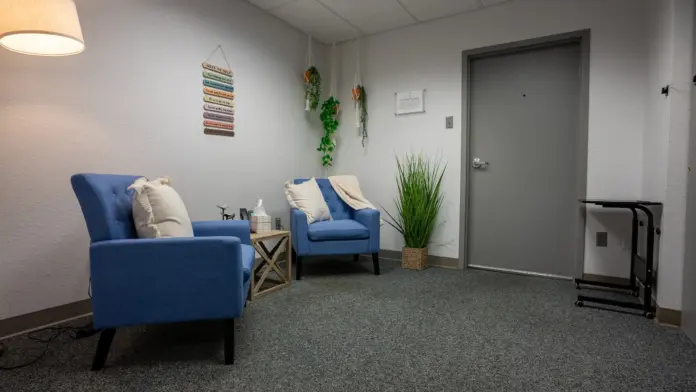
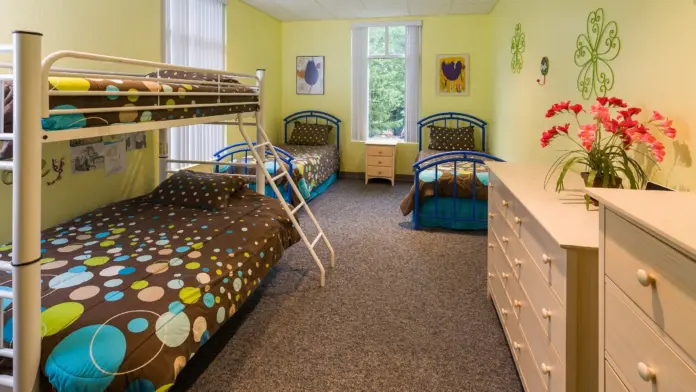
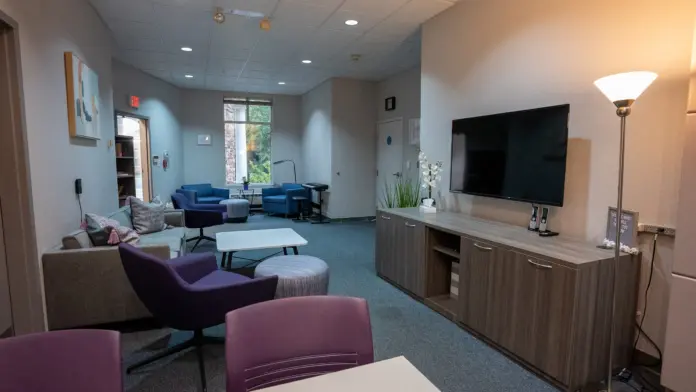
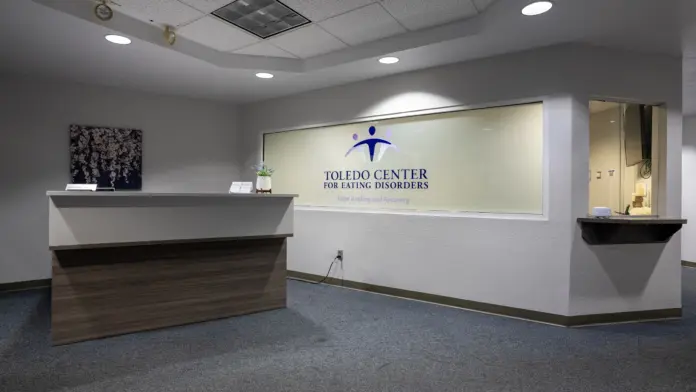
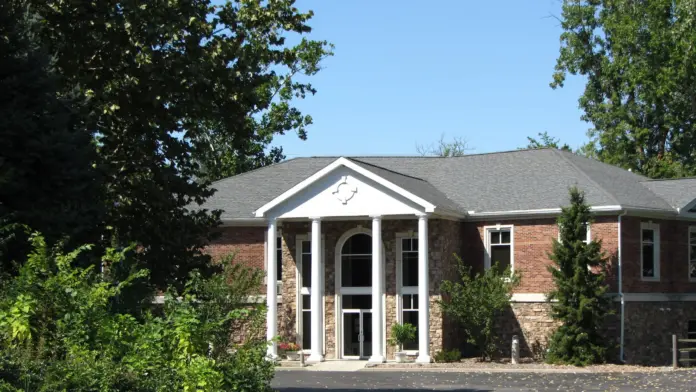
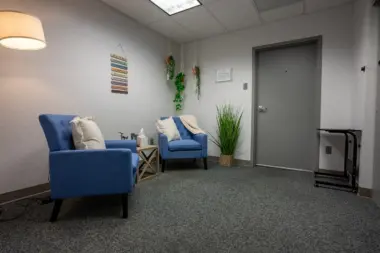
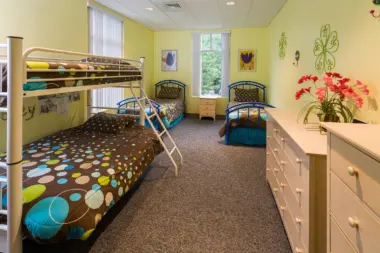
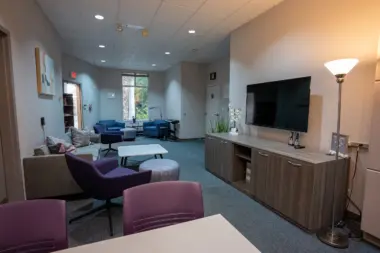
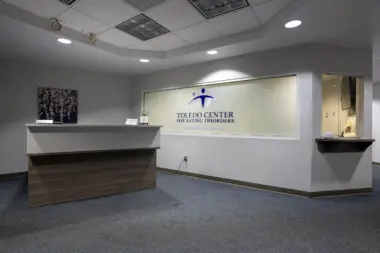
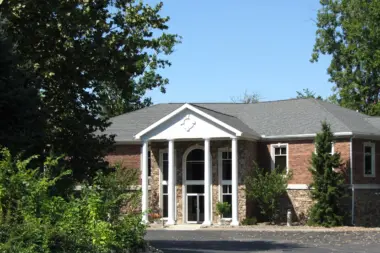
Accepted Insurance
Other Forms of Payment
Private insurance refers to any kind of healthcare coverage that isn't from the state or federal government. This includes individual and family plans offered by an employer or purchased from the Insurance Marketplace. Every plan will have different requirements and out of pocket costs so be sure to get the full details before you start treatment.
Self-pay involves paying for treatment out of your own pocket. You can use savings or credit, get a personal loan, or receive help from family and friends to fund your treatment. If you don't have insurance or your insurance plan doesn't cover a specific program, self-pay can help ensure you still get the care you need.
Financial aid can take many forms. Centers may have grants or scholarships available to clients who meet eligibility requirements. Programs that receive SAMHSA grants may have financial aid available for those who need treatment as well. Grants and scholarships can help you pai for treatment without having to repay.
Sliding scale payments are based on a client's income and family size. The goal is to make treatment affordable to everyone. By taking these factors into account, addiction recovery care providers help ensure that your treatment does not become a financial burden to you or your family, eliminating one barrier to care.
Medicare is a federal program that provides health insurance for those 65 and older. It also serves people under 65 with chronic and disabling health challenges. To use Medicare for addiction treatment you need to find a program that accepts Medicare and is in network with your plan. Out of pocket costs and preauthorization requirements vary, so always check with your provider.
Medicaid is a state based program that helps lower-income individuals and families pay for healthcare. Medicaid covers addiction treatment so those enrolled can use their coverage to pay for rehab. When a program accepts Medicaid the client often pays very little or nothing out of their own pocket.
Military members, veterans, and eligible dependents have access to specific insurance programs that help them get the care they need. TRICARE and VA insurance can help you access low cost or no cost addiction and mental health treatment. Programs that accept military insurance often have targeted treatment focused on the unique challenges military members, veterans, and their families face.
Addiction Treatments
Levels of Care
Outpatient programs are for those seeking mental rehab or drug rehab, but who also stay at home every night. The main difference between outpatient treatment (OP) and intensive outpatient treatment (IOP) lies in the amount of hours the patient spends at the facility. Most of the time an outpatient program is designed for someone who has completed an inpatient stay and is looking to continue their growth in recovery. Outpatient is not meant to be the starting point, it is commonly referred to as aftercare. The River Centre Clinic provides outpatient services to adults and adolescents with eating disorder symptoms that do not require a higher level of care. Outpatient therapy is an integral part of the transition from higher levels of care at the River Centre Clinic (Partial Hospitalization and Adolescent Residential). After completing these more intensive programs, patients can transition to outpatient therapy as part of their discharge plan. The Outpatient Program is certified by the Ohio Department of Mental Health and includes a multidisciplinary staff of therapists including physician consultants, licensed psychologists, psychology fellows, and licensed independent social workers.
Intensive Outpatient programs are for those who want or need a very structured treatment program but who also wish to live at home and continue with certain responsibilities (such as work or school). IOP substance abuse treatment programs vary in duration and intensity, and certain outpatient rehab centers will offer individualized treatment programs. The River Centre Clinic’s Intensive Outpatient Program (IOP) is 4 hours a day, 3-5 days a week, specifically designed for people with Binge Eating Disorder (BED). It includes the opportunity for low cost or free independent living (depending on the space availability) so that people from outside of our local community have the opportunity to receive the specialized care that they need. BED is characterized by eating abnormal amounts of food while feeling unable to stop and is sometimes referred to as “compulsive overeating.” Although BED can occur in those who are normal weight, as the cycle of binge eating cycle progresses, it often leads to unwanted weight gain and obesity which can indirectly fuel further compulsive overeating. This eating pattern is usually intertwined with a turbulent emotional mixture of shame, guilt, depression and anxiety. These negative feelings often lead the person struggling with BED to continue to use food to cope, creating a vicious cycle. There is evidence that individuals with BED display rates of emotional distress, impaired quality of life and medical problems that are similar to other eating disorder diagnoses. Individuals with BED respond well to psychological and nutritional rehabilitation treatment designed specifically to address this eating disorder.
Residential treatment programs are those that offer housing and meals in addition to substance abuse treatment. Rehab facilities that offer residential treatment allow patients to focus solely on recovery, in an environment totally separate from their lives. Some rehab centers specialize in short-term residential treatment (a few days to a week or two), while others solely provide treatment on a long-term basis (several weeks to months). Some offer both, and tailor treatment to the patient's individual requirements. The Adolescent Residential Program (ARP) at River Centre Clinic provides female and male adolescents who have serious eating disorders with a higher level of structure and support than is possible during outpatient treatment. Most ARP patients live in the Adolescent Residence on the second floor of the main treatment facility, where they are monitored by staff members 24 hours per day, 7 days per week. ARP patients who live in the local area usually commute to River Centre Clinic and stay for 7 to 12 hours each day. The program has capacity for 8 to 12 patients, including both residents and local commuters. River Centre Clinic is certified as a mental health agency and is licensed to operate a residential facility by the Ohio Department of Mental Health.
Completing a drug or alcohol rehab program shouldn’t spell the end of substance abuse treatment. Aftercare involves making a sustainable plan for recovery, including ongoing support. This can include sober living arrangements like halfway houses, career counseling, and setting a patient up with community programs like Alcoholics Anonymous (AA) or Narcotics Anonymous (NA). Aftercare and follow-up are critical aspects of treatment since the initial phase of treatment rarely is sufficient for total recovery. The facility takes aftercare very seriously and work closely with home treatment team to develop a plan that assures continued progress after discharge.
Designed for individuals with moderate to severe addictions, a partial hospitalization program (PHP) provides a more intensive form of outpatient therapy. PHP treatment can serve as an alternative to inpatient hospitalization or as a step-down option after being discharged from a hospital or residential program. A partial hospitalization program typically requires a minimum of 20 hours weekly for an average of 90 days. Depending on your care plan, PHPs can include relapse prevention, medication management, and behavioral therapy services.
Treatments
Mental health rehabs focus on helping individuals recover from mental illnesses like bipolar disorder, clinical depression, anxiety disorders, schizophrenia, and more. Mental health professionals at these facilities are trained to understand and treat mental health issues, both in individual and group settings.
Programs
Adult rehab programs include therapies tailored to each client's specific needs, goals, and recovery progress. They are tailored to the specific challenges adult clients may face, including family and work pressures and commitments. From inpatient and residential treatment to various levels of outpatient services, there are many options available. Some facilities also help adults work through co-occurring conditions, like anxiety, that can accompany addiction.
Young adulthood can be an exciting, yet difficult, time of transition. Individuals in their late teens to mid-20s face unique stressors related to school, jobs, families, and social circles, which can lead to a rise in substance use. Rehab centers with dedicated young adult programs will include activities and amenities that cater to this age group, with an emphasis on specialized counseling, peer socialization, and ongoing aftercare.
Clinical Services
Cognitive Behavioral Therapy (CBT) is a therapy modality that focuses on the relationship between one's thoughts, feelings, and behaviors. It is used to establish and allow for healthy responses to thoughts and feelings (instead of unhealthy responses, like using drugs or alcohol). CBT has been proven effective for recovering addicts of all kinds, and is used to strengthen a patient's own self-awareness and ability to self-regulate. CBT allows individuals to monitor their own emotional state, become more adept at communicating with others, and manage stress without needing to engage in substance abuse.
Whether a marriage or other committed relationship, an intimate partnership is one of the most important aspects of a person's life. Drug and alcohol addiction affects both members of a couple in deep and meaningful ways, as does rehab and recovery. Couples therapy and other couples-focused treatment programs are significant parts of exploring triggers of addiction, as well as learning how to build healthy patterns to support ongoing sobriety.
Creativity is inherently healing, and can help those in recovery express thoughts or feelings they might not otherwise be able to. Creative arts therapy can include music, poetry/writing, painting, sculpting, dance, theater, sandplay, and more. Unlike traditional art, the final product matters far less than the experience of creation and expression itself.
Dialectical Behavior Therapy (DBT) is a modified form of Cognitive Behavioral Therapy (CBT), a treatment designed to help people understand and ultimately affect the relationship between their thoughts, feelings, and behaviors. DBT is often used for individuals who struggle with self-harm behaviors, such as self-mutilation (cutting) and suicidal thoughts, urges, or attempts. It has been proven clinically effective for those who struggle with out-of-control emotions and mental health illnesses like Borderline Personality Disorder.
Eating disorders include anorexia, bulimia, binge eating, and dysfunctional eating patterns. Many psychologists and other mental health professionals consider eating disorders to be food addictions, meaning food is being used in an addictive way (similar to drug or alcohol addiction). Certain substance abuse treatment programs will have treatment for eating disorders as one of the services offered. An eating disorder may also present as a co-occuring disorder or dual diagnosis alongside drug and alcohol addiction.
Experiential therapy is a form of therapy in which clients are encouraged to surface and work through subconscious issues by engaging in real-time experiences. Experiential therapy departs from traditional talk therapy by involving the body, and having clients engage in activities, movements, and physical and emotional expression. This can involve role-play or using props (which can include other people). Experiential therapy can help people process trauma, memories, and emotion quickly, deeply, and in a lasting fashion, leading to substantial and impactful healing.
Research clearly demonstrates that recovery is far more successful and sustainable when loved ones like family members participate in rehab and substance abuse treatment. Genetic factors may be at play when it comes to drug and alcohol addiction, as well as mental health issues. Family dynamics often play a critical role in addiction triggers, and if properly educated, family members can be a strong source of support when it comes to rehabilitation.
Group therapy is any therapeutic work that happens in a group (not one-on-one). There are a number of different group therapy modalities, including support groups, experiential therapy, psycho-education, and more. Group therapy involves treatment as well as processing interaction between group members.
In individual therapy, a patient meets one-on-one with a trained psychologist or counselor. Therapy is a pivotal part of effective substance abuse treatment, as it often covers root causes of addiction, including challenges faced by the patient in their social, family, and work/school life.
Life skills trainings involve all the skills a person must have in order to function successfully in the world. These include time management, career guidance, money management, and effective communication. Truly successful addiction recovery is based on the ability to not only live substance-free, but to thrive. Life skills teaches the practical necessities of functioning in society, which sets clients up for success in life, and therefore sobriety.
Nutrition therapy, aka medical nutrition therapy (MNT), is a way of treating physical, emotional, and medical conditions through diet. Specific dietary plans are designed by professional nutritionists or registered dietitians, and patients follow them in order to positively affect their physical and mental health.
Trauma therapy addresses traumatic incidents from a client's past that are likely affecting their present-day experience. Trauma is often one of the primary triggers and potential causes of addiction, and can stem from child sexual abuse, domestic violence, having a parent with a mental illness, losing one or both parents at a young age, teenage or adult sexual assault, or any number of other factors. The purpose of trauma therapy is to allow a patient to process trauma and move through and past it, with the help of trained and compassionate mental health professionals.
Amenities
-
Private Setting
-
Lakeside
-
Wifi
-
Residential Setting
Staff & Accreditations
Staff

Chrissy Hall, LCSW
Group CEO

Olivia Dunbar, LISW S
Executive Director

Dr. Tom Scales, MD
Network Medical Director

Kate Fisch, LCSW
AVP of Clinical Operations, Eating Disorder Network

Alycia Aldieri, LPC
AVP of Eating Disorder Admissions
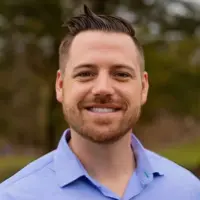
Stefan Glamp
National Director of Alumni Services

Alicia Trabbic, MSW,LISW S
Clinical Director
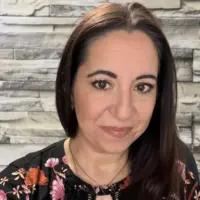
Abbey Boston, BSN, RN
Director of Nursing
Accreditations

The Commission on Accreditation of Rehabilitation Facilities (CARF) is a non-profit organization that specifically accredits rehab organizations. Founded in 1966, CARF's, mission is to help service providers like rehab facilities maintain high standards of care.
CARF Accreditation: Yes
Contact Information
5465 Main street
Sylvania OH, 43560










